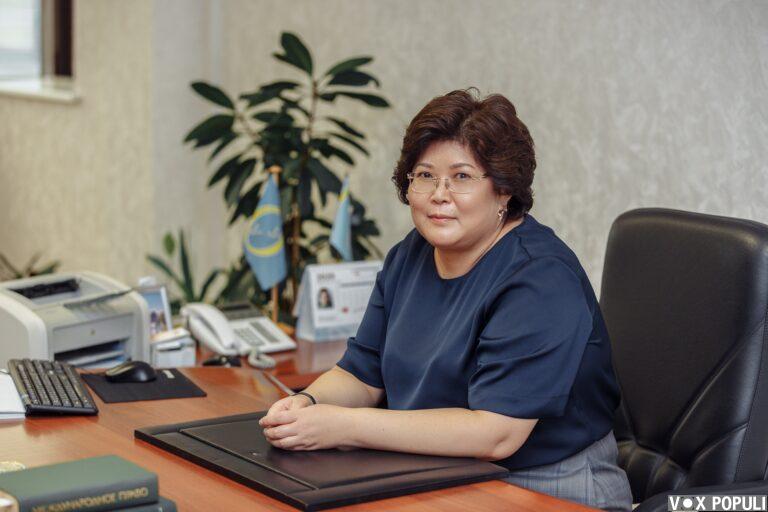NUR-SULTAN – All matters of human rights violation of detainees: ill-treatment, absence of lawyers, and psychological pressure will be thoroughly examined and treated accordingly, said Kazakhstan’s Commissioner for Human Rights, Elvira Azimova in her appeal to Kazakh citizens on Jan. 27.

Kazakhstan’s Commissioner for Human Rights, Elvira Azimova.
From Jan. 13 to 24, regional groups of the National Preventive Mechanism for the prevention of torture and ill-treatment visited and conducted independent monitoring of 81 detention places, including pre-trial detention centers, temporary detention facilities and holding cells in 16 regions of Kazakhstan.
As the outcome of the visits, 39 claims of violations of rights were received. Overall, the prosecutor’s office has received 109 complaints about illegal investigative methods, unjustified detention, disagreement with court decisions on administrative penalties, failure to provide medical care, and non-admission of lawyers. Following the assessment of claims, 21 criminal cases were initiated.
During her visit to Atyrau she spoke with the residents who were detained in a sports center used as a temporary detention place. The Atyrau sports center attracted public attention due to claims of illegal torture and beating of detainees published on social network platforms and on media.
“Citizens who were in custody in this room reported beatings and ill-treatment and other degrading actions and said that they were forced to sign procedural documents under pressure, and were not provided access to lawyers, drinking water and food, medical care in connection with their injuries,” said Azimova.
The investigation of this matter has begun under the direct control of the Internal Security Service of the Ministry of Internal Affairs. Azimova requested the prosecutor general’s office examine all the complaints regarding the issue, including messages on social networks and anonymous messages, and to use video recordings of law enforcement premises if necessary.
“We must remember that the Law does not abolish the requirements for the observance of human rights in conditions of detention,” she added. Azimova emphasized that “all evidence obtained under duress is invalid.”
Complaints about the poor quality of legal services also will be addressed according to Azimova. She said that courts and investigators should take into account the fact that many citizens did not have access to information about their lawyers and their contact details.
Protection of witnesses in criminal cases is another issue that should not be overlooked. “We need to eliminate harassment and pressure on citizens who decided to give statements to the media and to the prosecutor’s office,” said Azimova.
Azimova also urged prosecutors to speed up the process of reviewing detention measures for citizens whose validity of detention is in doubt, those who need constant monitoring and treatment due to injuries, chronic diseases, and women with young children.
“There were two women in the pre-trial detention center in Kyzylorda, one of them had a breastfed baby, and the other had a child of four years old. Based on our appeal, the prosecutor’s office changed the punishment, and the women are now at home with their children,” said Azimova.
Timely medical treatment should also be ensured for all imprisoned citizens according to her. “This is not only a requirement of national legislation. This is a United Nations requirement regarding the detention of prisoners,” she said.
As of Jan. 25, there were 63 arrested citizens with bullet wounds. Twenty-nine of them were sent to hospitals for treatment, 12 are in the medical part of the isolation ward. The remaining 29 people are on outpatient treatment and have been regularly visited by civilian doctors.
Replacement of a fine with a warning should be considered for socially vulnerable categories of citizens, such as pensioners, unemployed, and people with disabilities, said Azimova.
She also suggested considering mild forms of punishment for citizens who were involved in criminal prosecution in connection to mass riots for first time offenses. “I ask to take into account not only the severity of their actions, but also their personality, and sincere repentance,” she said.
Alternative penalties for such detainees might include agreements not to leave the place of residency, house arrest, and personal guarantees.
All measures to secure human rights are directed towards building a norm around peaceful rallies. Azimova drew attention to the fact that unresolved socio-economic and political problems were the reason for mass rallies in the country as President Kassym-Jomart Tokayev said in his January Majilis (a lower house of Parliament) statement.
“Participation in mass rallies of many citizens was dictated by the desire to publicly express their opinion on the situation. However, such a step does not justify those who used violence, weapons, and purposefully committed attacks.”
“It is necessary to include all procedural mechanisms, taking into account a fact recognized by the state: that peaceful rallies took place before the riots,” she added.
As of Jan. 25, 9,257 administrative cases are being examined related to the January events, 4,584 of them were assessed without any further penalties – people were given a warning by the court.
Addressing the prospects, Azimova said that “together with civil society and lawyers we must begin a lot of work to discuss the problematic issues that we have encountered.”
“They include issues of strengthening the rapid response to mass riots, improving legislation and practice in terms of humanitarian actions in a state of emergency with the involvement of citizens and non-governmental organizations, as well as providing free legal, social and psychological assistance during such periods, ensuring the safety of civilians and strengthening guarantees for the protection of the rights of citizens who find themselves involved in criminal prosecution.”
This is the Commissioner’s second statement on the human rights situation in connection with the January events. The first statement was made on Jan. 13. following her visit of 34 detention facilities in 11 regions together with civil society representatives and the groups from the National Preventive Mechanism (against torture).

